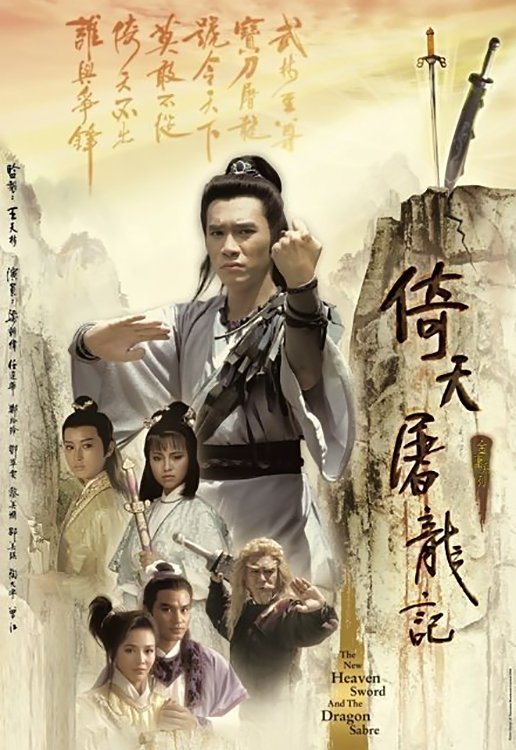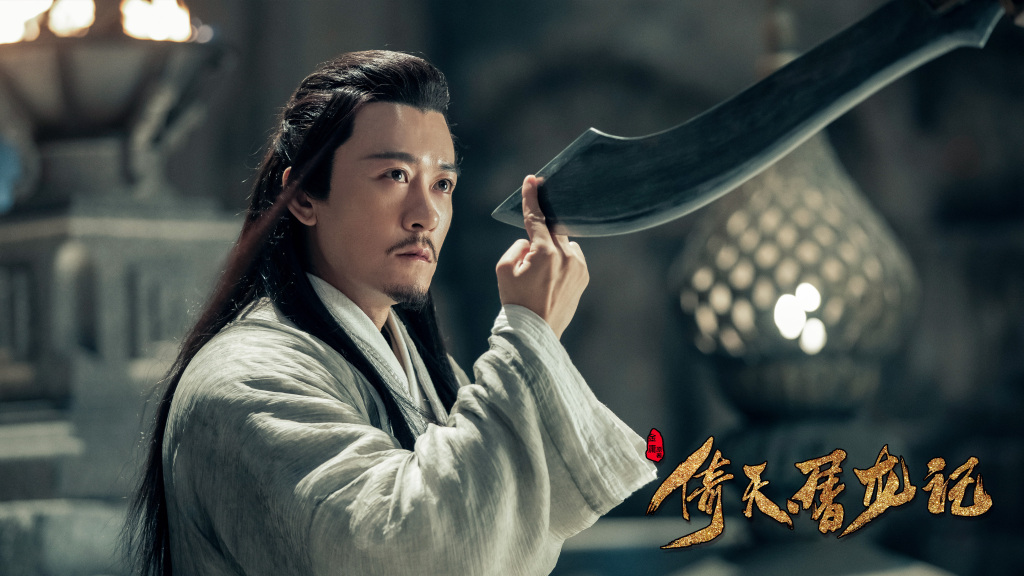
Zhang Wuji of the book is not a one-dimensional fellow: he is annoyingly indecisive and inconclusive, and Leung's unassuming, subtle performance effectively portrays these and makes as if the character has just jumped out of the pages. Some have complained that his portrayal of Zhang Wuji is understated and confused, yet those who have read the book will know that such portrayal only serves to make the character's restraint and complexity more real. Tony Leung Chiu-wai did an unsurpassable job in making viewers believe that he IS Zhang Wuji from the beginning to the end of the series. Having said that, it is really the main characters who carry the show. Simon Yam and Carol Cheng are perfectly casted as the honest, heroic Zhang Cuisan and mischievous Yin Susu respectively, while other sidekicks such as the Green Bat and other Ming sect heroes also manage to project their unique characteristics in an interesting and likeable way.

This can be seen among all when he teased Wuji of his girlfriends and played matchmaker for him and Zhou Zhiruo-some of the many scenes in which he fared much better than his characterless successor in the 2002 version. Bao Fang is pitch-perfect as the wise and great Zhang Sanfeng, while Kenneth Tsang perfectly blend Xie Xun's wildness and lunacy with his humane and sometimes witty sides. Indeed, Jin Yong once stated that HSDS is mainly about relationships between the characters: the father-son relationship between Wuji and Xie Xun, the close ties between Zhang Sanfeng and his disciples and between the seven Wudang brothers. The version also wonderfully portray the unique characteristic of each of the Seven Wudang heroes and the emotional brotherhood ties between them, more successfully than the 2002 version. Almost all supporting characters effortlessly look and act their roles, particularly the actors who play Yang xiao, Cheng Kun and Song YuanQiao. I have to agree with another reviewer on this site who said that all characters in the 1986 version, even the minor ones, are wonderfully portrayed and developed. In the 2002 version these events are revealed as they happen, which rob the story of its suspense and surprises, and even prolonged with irrelevant additional scenes such as Zhao Min's imprisonment by her father and her painstaking attempts to escape. Yet this version is wise enough to keep viewers wondering about certain things until the end of the show, such as how Xie Xun falls into the hands of Shaolin and who has killed In Lee and stolen the Heaven Sword and Dragon Sabre. Some examples are Song Qing Shu's first encounter with Zhou Zhiruo, which is explored deeper than in the novel and thus intensifies his later jealousy of Zhang Wuji, and the confusion in Wudang when Wuji is reported missing, which shows their deep concerns about him. Most of the book's plot and dialogue are retained, complemented and intensified by some interesting additional subplots that smoothly integrate to the main story. With a superb cast and a complex, yet cohesive storyline, this adaptation manages to stay faithful to the novel's complexity and spirit without falling into the trap of becoming a superficial rendition of the book. Wuji, who is now an orphan, has to undergo a lot of sufferings before he accidentally finds martial arts skills that not only rescue him from premature death, but also turn him into Ming-sect leader and the hero of the martial arts world.

Their relationships are so close that Cuisan and Susu chose to commit suicide when pushed by the Righteous sects to reveal Xie Xun's hiding place. When Wuji's parents are stranded in an island with another famed Ming sect member Golden maned-lion Xie Xun, they become sworn brothers, and Xie Xun takes Wuji as his godson. His father Zhang Cuisan is the fifth and most talented hero of the famous seven Wudang heroes, while his mother Yin Susu is the daughter of White-brow Eagle, a former member of Ming Sect who established his own sect. The story basically tells the life of Zhang Wuji, an outstanding young hero who will later solve longtime misunderstandings between so-called Righteous and Evil (Ming) sects and unite them in a revolution against Mongolian conquest. There is no need to go into details here-you can read the complete storyline on websites about Jin Yong's novels. Since the 2002 version is the only other version I saw after the 1986 version, it will be the only version I use for comparison in this review. Like many people, my favourite is the 1986 HK-TVB version, although I think the latest China-Taiwan version does not fare too bad as well.

#HEAVENLY SWORD DRAGON SABER MOVIE#
There have been five television adaptations of the story, not to mention the movie version starring Jet Li.

The last novel of Jin Yong's Condor Heroes trilogy, The Heavenly Sword and the Dragon Sabre (HSDS) is also the most frequently adapted.


 0 kommentar(er)
0 kommentar(er)
